Early Education: Impact of Play on Literacy Development Analysis
VerifiedAdded on 2020/04/07
|27
|4229
|263
Report
AI Summary
This research report examines the crucial role of play in early childhood education and its impact on literacy development, particularly for non-native English speakers. The study explores the effectiveness of various play activities, including socio-dramatic and musical play, in enhancing English language skills. Through observations, surveys, and experimental data, the research highlights how teachers can effectively integrate play into the curriculum to support children's literacy and language acquisition. The report delves into the methodologies used, including qualitative and quantitative data analysis, and presents findings on different types of play and their influence on children's learning behaviors. The research aims to understand how play supports literacy skills, the role of teachers in facilitating play-based learning, and how play enhances language skills for children with diverse linguistic backgrounds. The findings emphasize the importance of play as an integral part of the early literacy program, providing valuable insights for educators and researchers in the field.
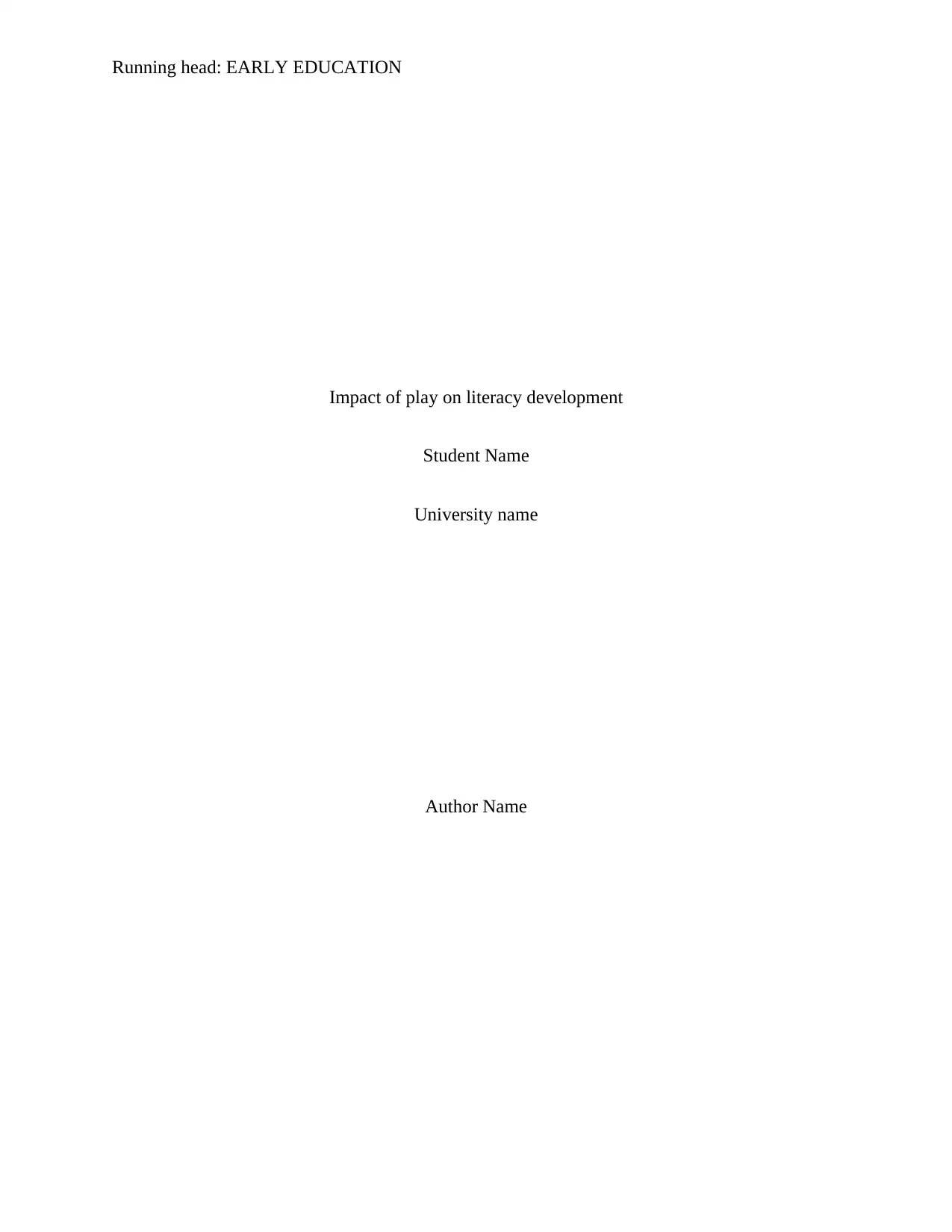
Running head: EARLY EDUCATION
Impact of play on literacy development
Student Name
University name
Author Name
Impact of play on literacy development
Student Name
University name
Author Name
Paraphrase This Document
Need a fresh take? Get an instant paraphrase of this document with our AI Paraphraser
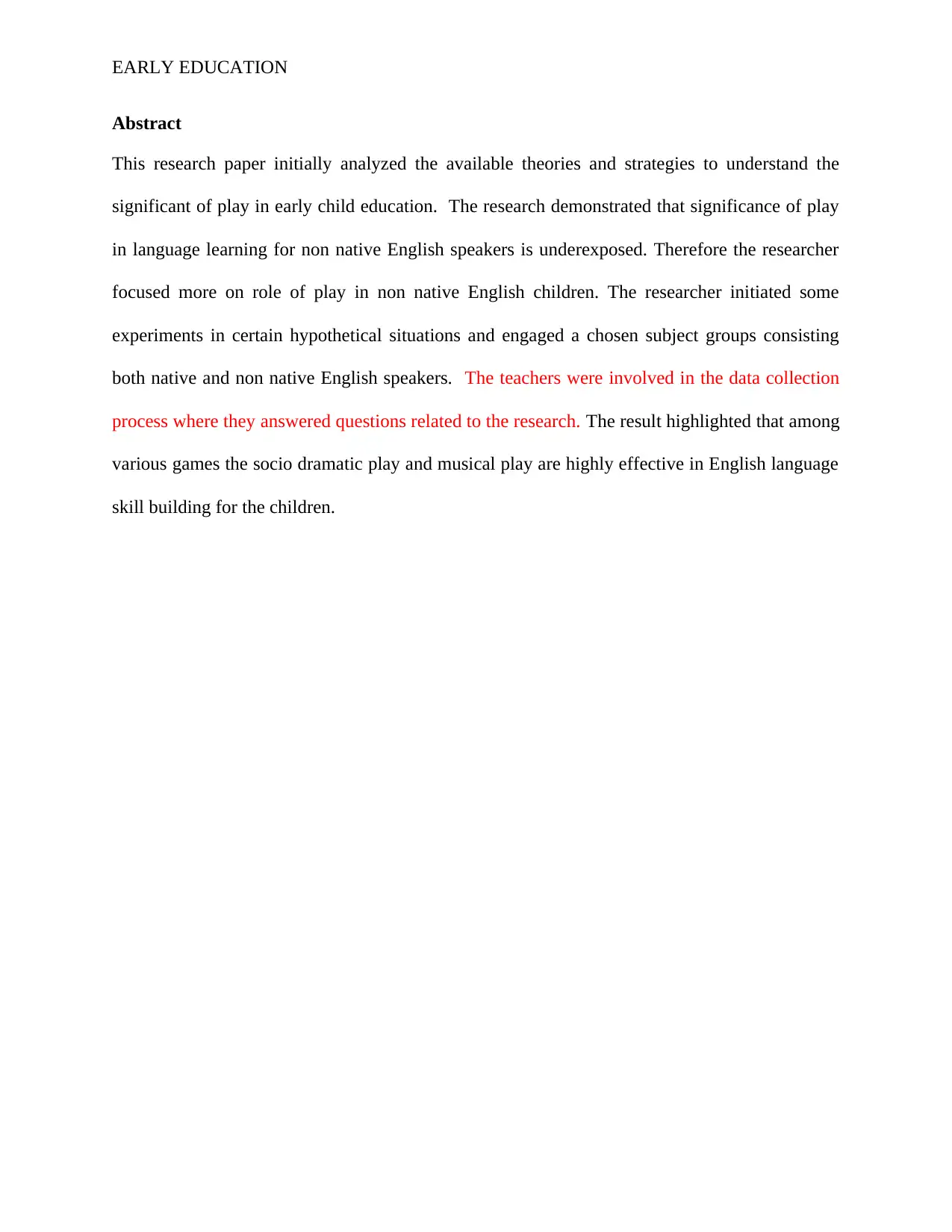
EARLY EDUCATION
Abstract
This research paper initially analyzed the available theories and strategies to understand the
significant of play in early child education. The research demonstrated that significance of play
in language learning for non native English speakers is underexposed. Therefore the researcher
focused more on role of play in non native English children. The researcher initiated some
experiments in certain hypothetical situations and engaged a chosen subject groups consisting
both native and non native English speakers. The teachers were involved in the data collection
process where they answered questions related to the research. The result highlighted that among
various games the socio dramatic play and musical play are highly effective in English language
skill building for the children.
Abstract
This research paper initially analyzed the available theories and strategies to understand the
significant of play in early child education. The research demonstrated that significance of play
in language learning for non native English speakers is underexposed. Therefore the researcher
focused more on role of play in non native English children. The researcher initiated some
experiments in certain hypothetical situations and engaged a chosen subject groups consisting
both native and non native English speakers. The teachers were involved in the data collection
process where they answered questions related to the research. The result highlighted that among
various games the socio dramatic play and musical play are highly effective in English language
skill building for the children.
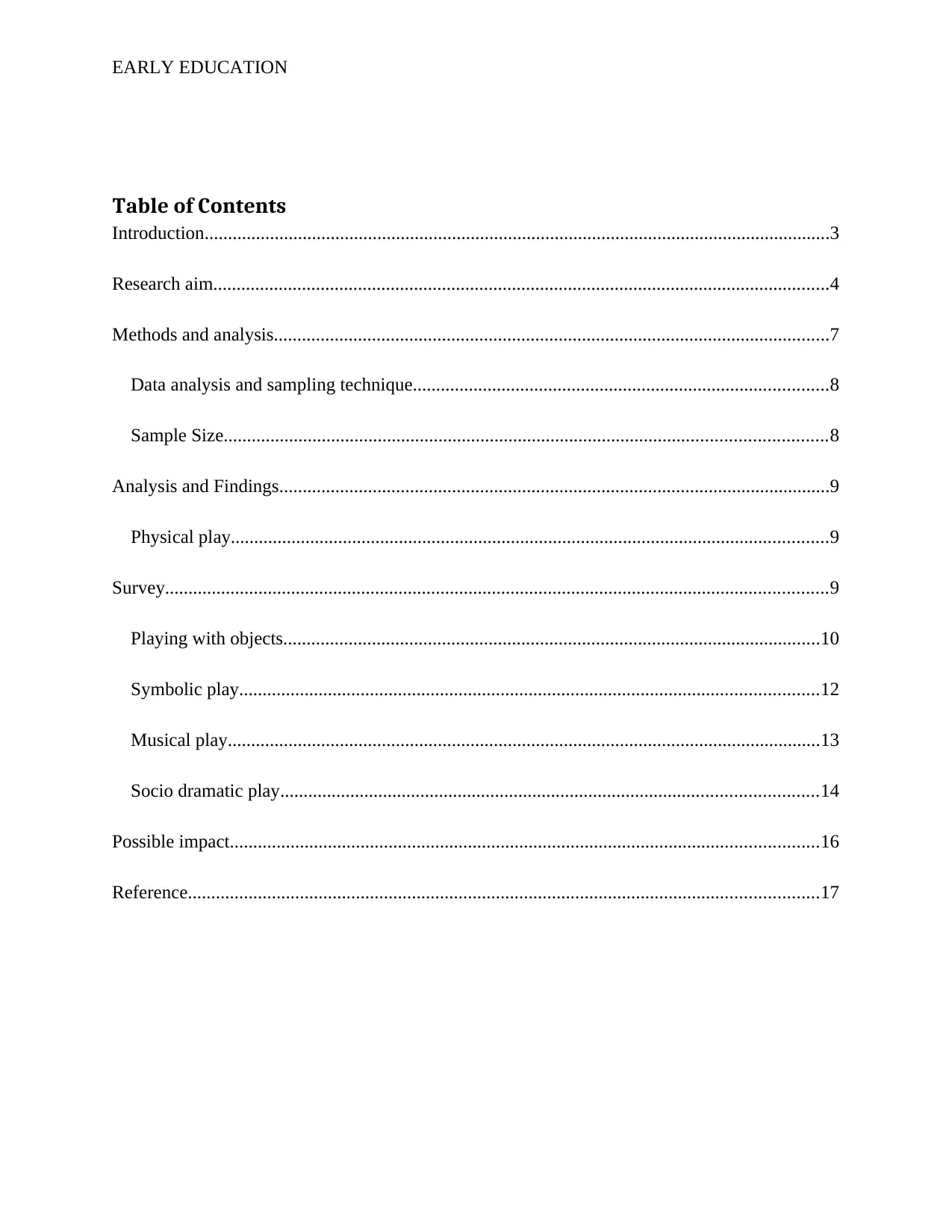
EARLY EDUCATION
Table of Contents
Introduction......................................................................................................................................3
Research aim....................................................................................................................................4
Methods and analysis.......................................................................................................................7
Data analysis and sampling technique.........................................................................................8
Sample Size.................................................................................................................................8
Analysis and Findings......................................................................................................................9
Physical play................................................................................................................................9
Survey..............................................................................................................................................9
Playing with objects...................................................................................................................10
Symbolic play............................................................................................................................12
Musical play...............................................................................................................................13
Socio dramatic play...................................................................................................................14
Possible impact..............................................................................................................................16
Reference.......................................................................................................................................17
Table of Contents
Introduction......................................................................................................................................3
Research aim....................................................................................................................................4
Methods and analysis.......................................................................................................................7
Data analysis and sampling technique.........................................................................................8
Sample Size.................................................................................................................................8
Analysis and Findings......................................................................................................................9
Physical play................................................................................................................................9
Survey..............................................................................................................................................9
Playing with objects...................................................................................................................10
Symbolic play............................................................................................................................12
Musical play...............................................................................................................................13
Socio dramatic play...................................................................................................................14
Possible impact..............................................................................................................................16
Reference.......................................................................................................................................17
⊘ This is a preview!⊘
Do you want full access?
Subscribe today to unlock all pages.

Trusted by 1+ million students worldwide
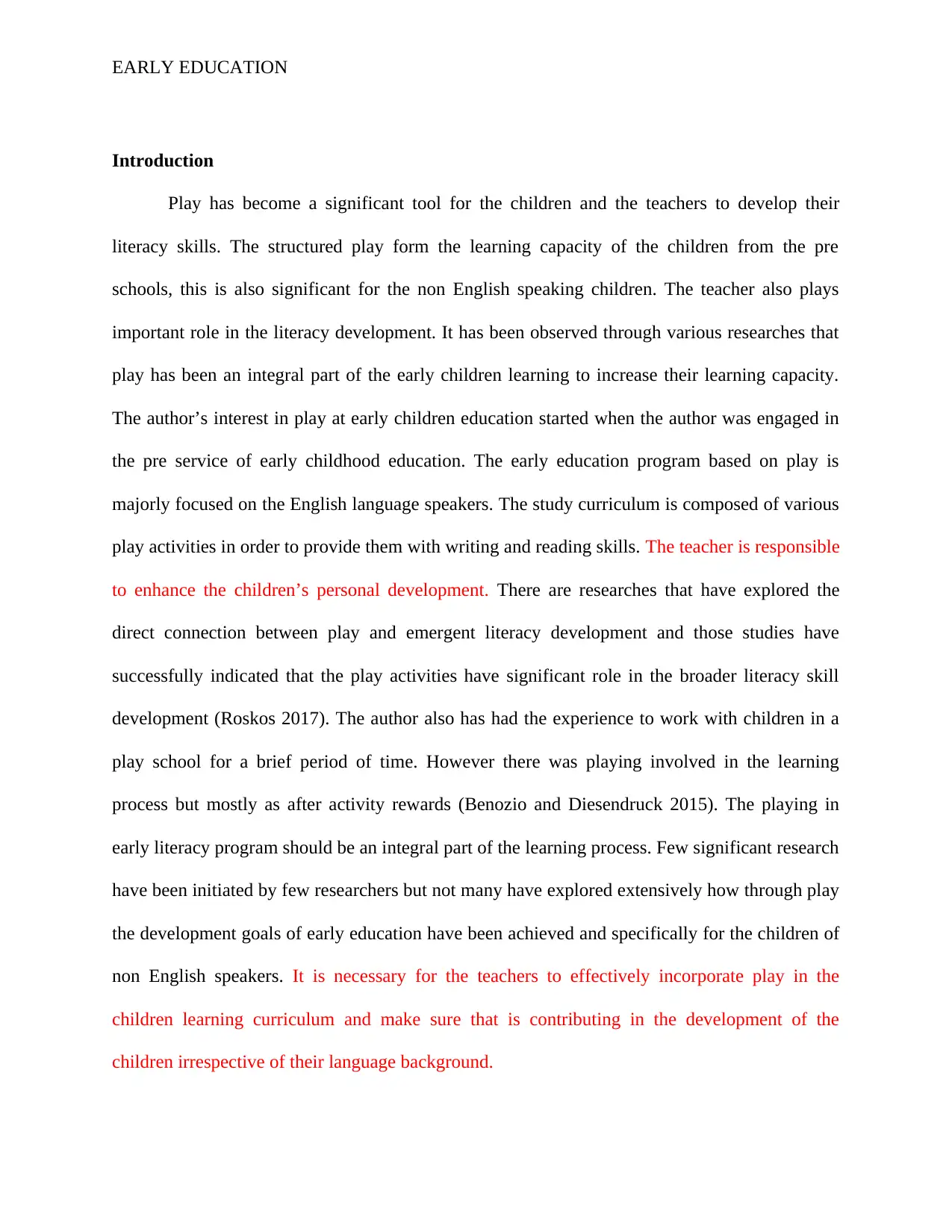
EARLY EDUCATION
Introduction
Play has become a significant tool for the children and the teachers to develop their
literacy skills. The structured play form the learning capacity of the children from the pre
schools, this is also significant for the non English speaking children. The teacher also plays
important role in the literacy development. It has been observed through various researches that
play has been an integral part of the early children learning to increase their learning capacity.
The author’s interest in play at early children education started when the author was engaged in
the pre service of early childhood education. The early education program based on play is
majorly focused on the English language speakers. The study curriculum is composed of various
play activities in order to provide them with writing and reading skills. The teacher is responsible
to enhance the children’s personal development. There are researches that have explored the
direct connection between play and emergent literacy development and those studies have
successfully indicated that the play activities have significant role in the broader literacy skill
development (Roskos 2017). The author also has had the experience to work with children in a
play school for a brief period of time. However there was playing involved in the learning
process but mostly as after activity rewards (Benozio and Diesendruck 2015). The playing in
early literacy program should be an integral part of the learning process. Few significant research
have been initiated by few researchers but not many have explored extensively how through play
the development goals of early education have been achieved and specifically for the children of
non English speakers. It is necessary for the teachers to effectively incorporate play in the
children learning curriculum and make sure that is contributing in the development of the
children irrespective of their language background.
Introduction
Play has become a significant tool for the children and the teachers to develop their
literacy skills. The structured play form the learning capacity of the children from the pre
schools, this is also significant for the non English speaking children. The teacher also plays
important role in the literacy development. It has been observed through various researches that
play has been an integral part of the early children learning to increase their learning capacity.
The author’s interest in play at early children education started when the author was engaged in
the pre service of early childhood education. The early education program based on play is
majorly focused on the English language speakers. The study curriculum is composed of various
play activities in order to provide them with writing and reading skills. The teacher is responsible
to enhance the children’s personal development. There are researches that have explored the
direct connection between play and emergent literacy development and those studies have
successfully indicated that the play activities have significant role in the broader literacy skill
development (Roskos 2017). The author also has had the experience to work with children in a
play school for a brief period of time. However there was playing involved in the learning
process but mostly as after activity rewards (Benozio and Diesendruck 2015). The playing in
early literacy program should be an integral part of the learning process. Few significant research
have been initiated by few researchers but not many have explored extensively how through play
the development goals of early education have been achieved and specifically for the children of
non English speakers. It is necessary for the teachers to effectively incorporate play in the
children learning curriculum and make sure that is contributing in the development of the
children irrespective of their language background.
Paraphrase This Document
Need a fresh take? Get an instant paraphrase of this document with our AI Paraphraser
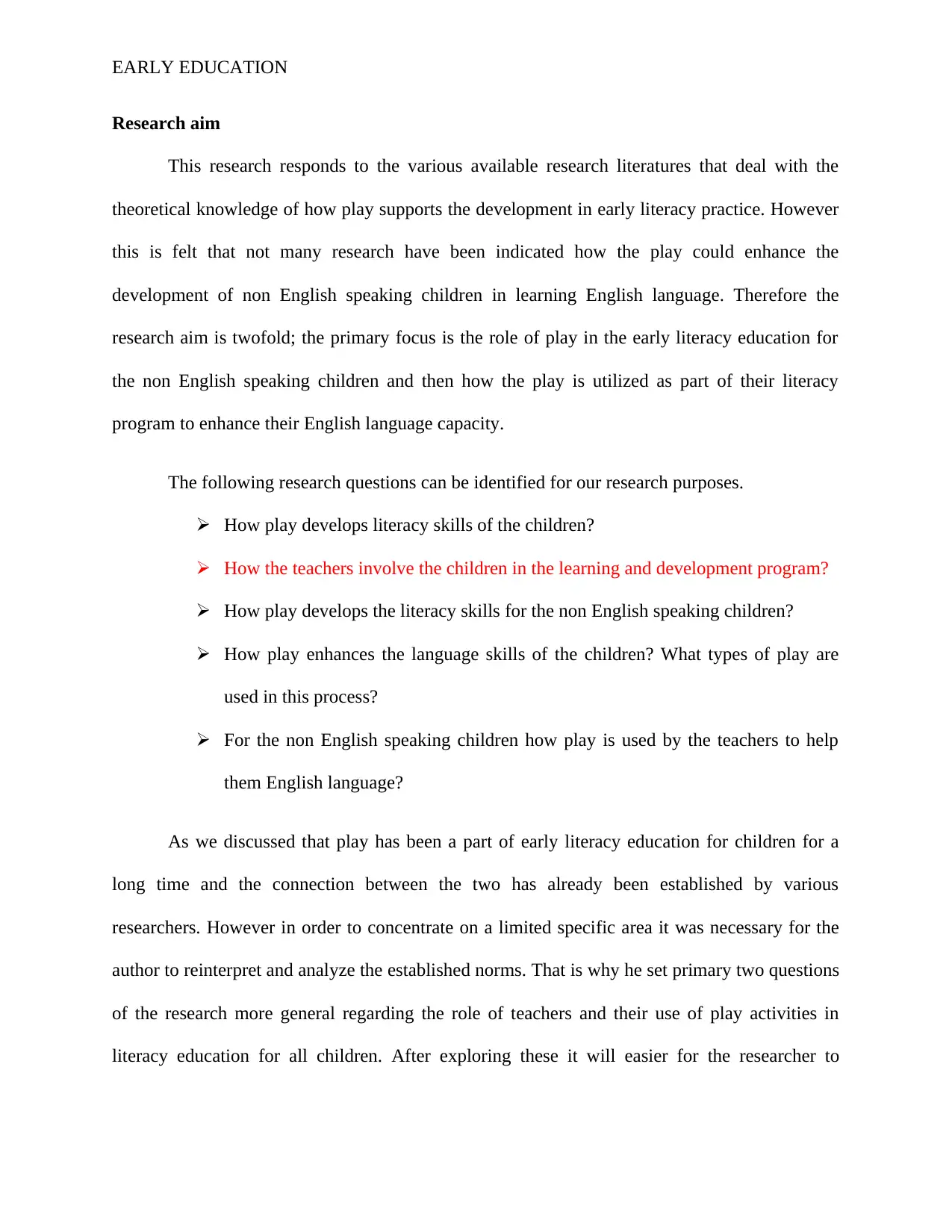
EARLY EDUCATION
Research aim
This research responds to the various available research literatures that deal with the
theoretical knowledge of how play supports the development in early literacy practice. However
this is felt that not many research have been indicated how the play could enhance the
development of non English speaking children in learning English language. Therefore the
research aim is twofold; the primary focus is the role of play in the early literacy education for
the non English speaking children and then how the play is utilized as part of their literacy
program to enhance their English language capacity.
The following research questions can be identified for our research purposes.
How play develops literacy skills of the children?
How the teachers involve the children in the learning and development program?
How play develops the literacy skills for the non English speaking children?
How play enhances the language skills of the children? What types of play are
used in this process?
For the non English speaking children how play is used by the teachers to help
them English language?
As we discussed that play has been a part of early literacy education for children for a
long time and the connection between the two has already been established by various
researchers. However in order to concentrate on a limited specific area it was necessary for the
author to reinterpret and analyze the established norms. That is why he set primary two questions
of the research more general regarding the role of teachers and their use of play activities in
literacy education for all children. After exploring these it will easier for the researcher to
Research aim
This research responds to the various available research literatures that deal with the
theoretical knowledge of how play supports the development in early literacy practice. However
this is felt that not many research have been indicated how the play could enhance the
development of non English speaking children in learning English language. Therefore the
research aim is twofold; the primary focus is the role of play in the early literacy education for
the non English speaking children and then how the play is utilized as part of their literacy
program to enhance their English language capacity.
The following research questions can be identified for our research purposes.
How play develops literacy skills of the children?
How the teachers involve the children in the learning and development program?
How play develops the literacy skills for the non English speaking children?
How play enhances the language skills of the children? What types of play are
used in this process?
For the non English speaking children how play is used by the teachers to help
them English language?
As we discussed that play has been a part of early literacy education for children for a
long time and the connection between the two has already been established by various
researchers. However in order to concentrate on a limited specific area it was necessary for the
author to reinterpret and analyze the established norms. That is why he set primary two questions
of the research more general regarding the role of teachers and their use of play activities in
literacy education for all children. After exploring these it will easier for the researcher to
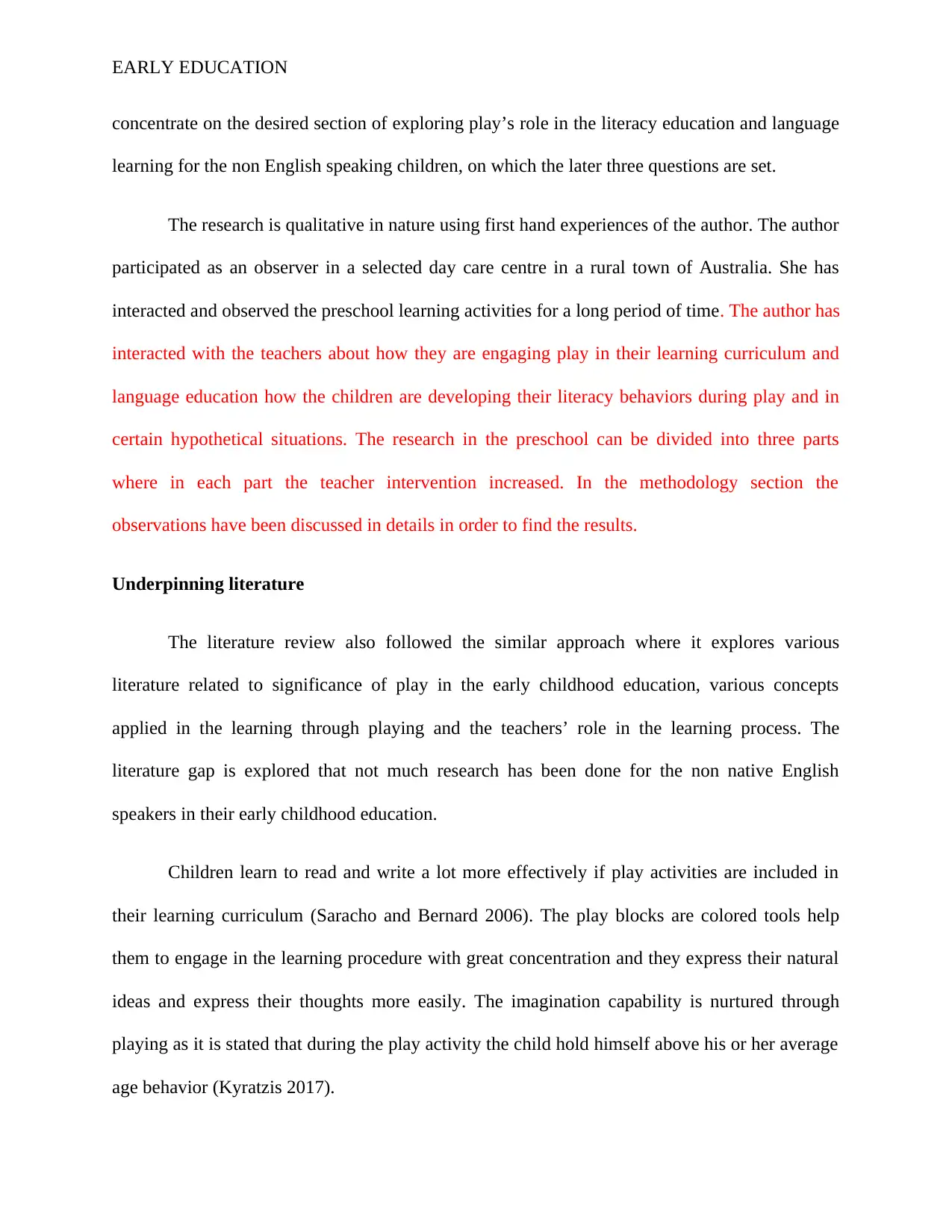
EARLY EDUCATION
concentrate on the desired section of exploring play’s role in the literacy education and language
learning for the non English speaking children, on which the later three questions are set.
The research is qualitative in nature using first hand experiences of the author. The author
participated as an observer in a selected day care centre in a rural town of Australia. She has
interacted and observed the preschool learning activities for a long period of time. The author has
interacted with the teachers about how they are engaging play in their learning curriculum and
language education how the children are developing their literacy behaviors during play and in
certain hypothetical situations. The research in the preschool can be divided into three parts
where in each part the teacher intervention increased. In the methodology section the
observations have been discussed in details in order to find the results.
Underpinning literature
The literature review also followed the similar approach where it explores various
literature related to significance of play in the early childhood education, various concepts
applied in the learning through playing and the teachers’ role in the learning process. The
literature gap is explored that not much research has been done for the non native English
speakers in their early childhood education.
Children learn to read and write a lot more effectively if play activities are included in
their learning curriculum (Saracho and Bernard 2006). The play blocks are colored tools help
them to engage in the learning procedure with great concentration and they express their natural
ideas and express their thoughts more easily. The imagination capability is nurtured through
playing as it is stated that during the play activity the child hold himself above his or her average
age behavior (Kyratzis 2017).
concentrate on the desired section of exploring play’s role in the literacy education and language
learning for the non English speaking children, on which the later three questions are set.
The research is qualitative in nature using first hand experiences of the author. The author
participated as an observer in a selected day care centre in a rural town of Australia. She has
interacted and observed the preschool learning activities for a long period of time. The author has
interacted with the teachers about how they are engaging play in their learning curriculum and
language education how the children are developing their literacy behaviors during play and in
certain hypothetical situations. The research in the preschool can be divided into three parts
where in each part the teacher intervention increased. In the methodology section the
observations have been discussed in details in order to find the results.
Underpinning literature
The literature review also followed the similar approach where it explores various
literature related to significance of play in the early childhood education, various concepts
applied in the learning through playing and the teachers’ role in the learning process. The
literature gap is explored that not much research has been done for the non native English
speakers in their early childhood education.
Children learn to read and write a lot more effectively if play activities are included in
their learning curriculum (Saracho and Bernard 2006). The play blocks are colored tools help
them to engage in the learning procedure with great concentration and they express their natural
ideas and express their thoughts more easily. The imagination capability is nurtured through
playing as it is stated that during the play activity the child hold himself above his or her average
age behavior (Kyratzis 2017).
⊘ This is a preview!⊘
Do you want full access?
Subscribe today to unlock all pages.

Trusted by 1+ million students worldwide
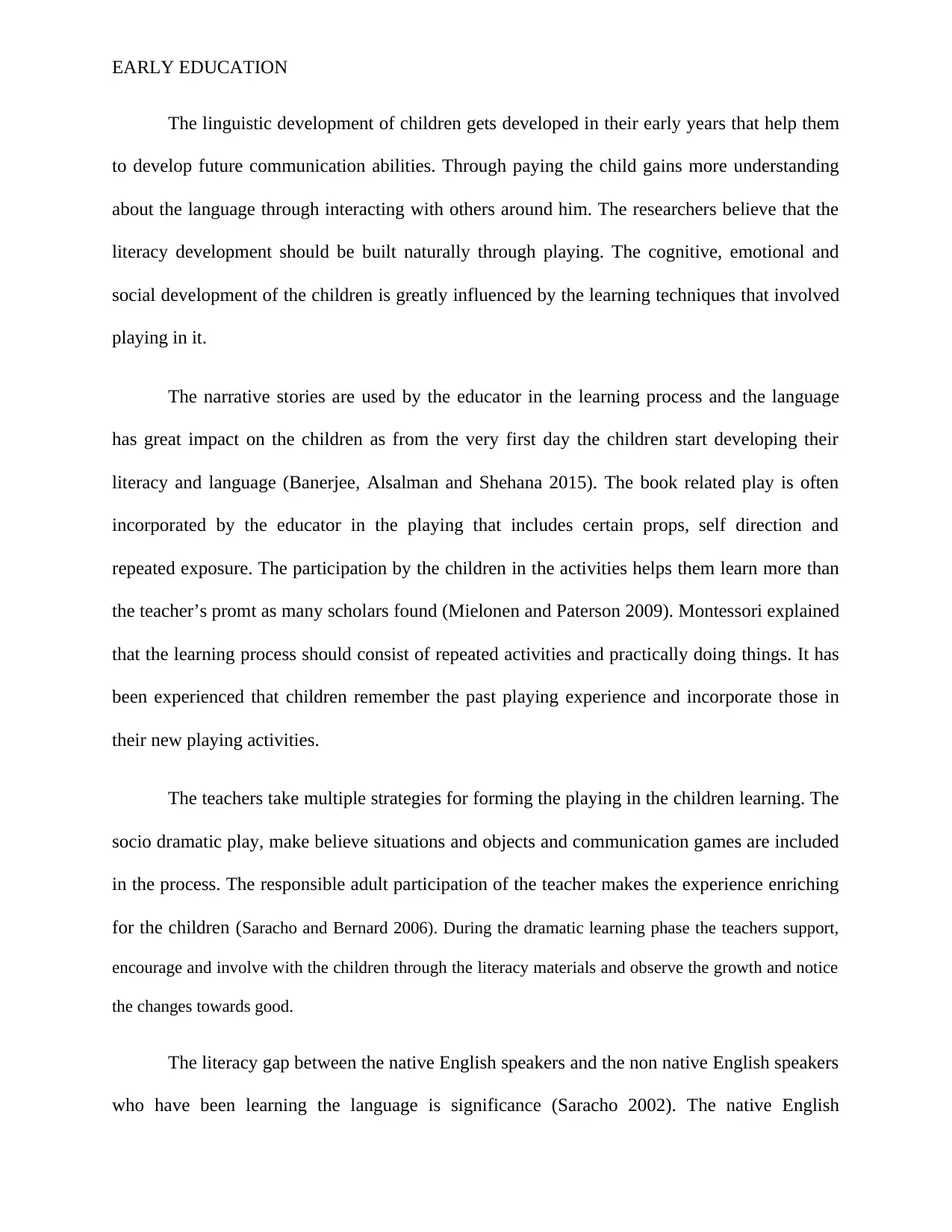
EARLY EDUCATION
The linguistic development of children gets developed in their early years that help them
to develop future communication abilities. Through paying the child gains more understanding
about the language through interacting with others around him. The researchers believe that the
literacy development should be built naturally through playing. The cognitive, emotional and
social development of the children is greatly influenced by the learning techniques that involved
playing in it.
The narrative stories are used by the educator in the learning process and the language
has great impact on the children as from the very first day the children start developing their
literacy and language (Banerjee, Alsalman and Shehana 2015). The book related play is often
incorporated by the educator in the playing that includes certain props, self direction and
repeated exposure. The participation by the children in the activities helps them learn more than
the teacher’s promt as many scholars found (Mielonen and Paterson 2009). Montessori explained
that the learning process should consist of repeated activities and practically doing things. It has
been experienced that children remember the past playing experience and incorporate those in
their new playing activities.
The teachers take multiple strategies for forming the playing in the children learning. The
socio dramatic play, make believe situations and objects and communication games are included
in the process. The responsible adult participation of the teacher makes the experience enriching
for the children (Saracho and Bernard 2006). During the dramatic learning phase the teachers support,
encourage and involve with the children through the literacy materials and observe the growth and notice
the changes towards good.
The literacy gap between the native English speakers and the non native English speakers
who have been learning the language is significance (Saracho 2002). The native English
The linguistic development of children gets developed in their early years that help them
to develop future communication abilities. Through paying the child gains more understanding
about the language through interacting with others around him. The researchers believe that the
literacy development should be built naturally through playing. The cognitive, emotional and
social development of the children is greatly influenced by the learning techniques that involved
playing in it.
The narrative stories are used by the educator in the learning process and the language
has great impact on the children as from the very first day the children start developing their
literacy and language (Banerjee, Alsalman and Shehana 2015). The book related play is often
incorporated by the educator in the playing that includes certain props, self direction and
repeated exposure. The participation by the children in the activities helps them learn more than
the teacher’s promt as many scholars found (Mielonen and Paterson 2009). Montessori explained
that the learning process should consist of repeated activities and practically doing things. It has
been experienced that children remember the past playing experience and incorporate those in
their new playing activities.
The teachers take multiple strategies for forming the playing in the children learning. The
socio dramatic play, make believe situations and objects and communication games are included
in the process. The responsible adult participation of the teacher makes the experience enriching
for the children (Saracho and Bernard 2006). During the dramatic learning phase the teachers support,
encourage and involve with the children through the literacy materials and observe the growth and notice
the changes towards good.
The literacy gap between the native English speakers and the non native English speakers
who have been learning the language is significance (Saracho 2002). The native English
Paraphrase This Document
Need a fresh take? Get an instant paraphrase of this document with our AI Paraphraser
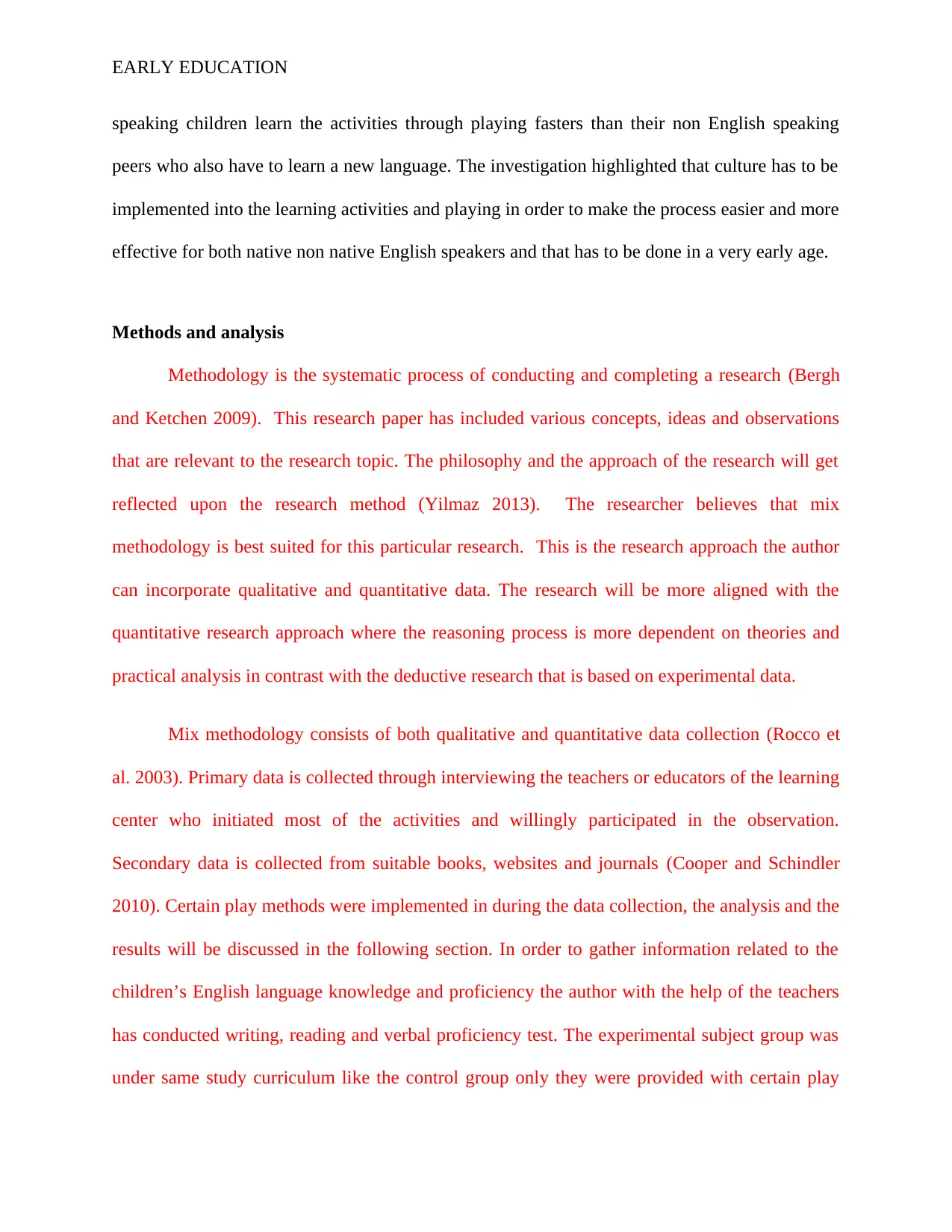
EARLY EDUCATION
speaking children learn the activities through playing fasters than their non English speaking
peers who also have to learn a new language. The investigation highlighted that culture has to be
implemented into the learning activities and playing in order to make the process easier and more
effective for both native non native English speakers and that has to be done in a very early age.
Methods and analysis
Methodology is the systematic process of conducting and completing a research (Bergh
and Ketchen 2009). This research paper has included various concepts, ideas and observations
that are relevant to the research topic. The philosophy and the approach of the research will get
reflected upon the research method (Yilmaz 2013). The researcher believes that mix
methodology is best suited for this particular research. This is the research approach the author
can incorporate qualitative and quantitative data. The research will be more aligned with the
quantitative research approach where the reasoning process is more dependent on theories and
practical analysis in contrast with the deductive research that is based on experimental data.
Mix methodology consists of both qualitative and quantitative data collection (Rocco et
al. 2003). Primary data is collected through interviewing the teachers or educators of the learning
center who initiated most of the activities and willingly participated in the observation.
Secondary data is collected from suitable books, websites and journals (Cooper and Schindler
2010). Certain play methods were implemented in during the data collection, the analysis and the
results will be discussed in the following section. In order to gather information related to the
children’s English language knowledge and proficiency the author with the help of the teachers
has conducted writing, reading and verbal proficiency test. The experimental subject group was
under same study curriculum like the control group only they were provided with certain play
speaking children learn the activities through playing fasters than their non English speaking
peers who also have to learn a new language. The investigation highlighted that culture has to be
implemented into the learning activities and playing in order to make the process easier and more
effective for both native non native English speakers and that has to be done in a very early age.
Methods and analysis
Methodology is the systematic process of conducting and completing a research (Bergh
and Ketchen 2009). This research paper has included various concepts, ideas and observations
that are relevant to the research topic. The philosophy and the approach of the research will get
reflected upon the research method (Yilmaz 2013). The researcher believes that mix
methodology is best suited for this particular research. This is the research approach the author
can incorporate qualitative and quantitative data. The research will be more aligned with the
quantitative research approach where the reasoning process is more dependent on theories and
practical analysis in contrast with the deductive research that is based on experimental data.
Mix methodology consists of both qualitative and quantitative data collection (Rocco et
al. 2003). Primary data is collected through interviewing the teachers or educators of the learning
center who initiated most of the activities and willingly participated in the observation.
Secondary data is collected from suitable books, websites and journals (Cooper and Schindler
2010). Certain play methods were implemented in during the data collection, the analysis and the
results will be discussed in the following section. In order to gather information related to the
children’s English language knowledge and proficiency the author with the help of the teachers
has conducted writing, reading and verbal proficiency test. The experimental subject group was
under same study curriculum like the control group only they were provided with certain play
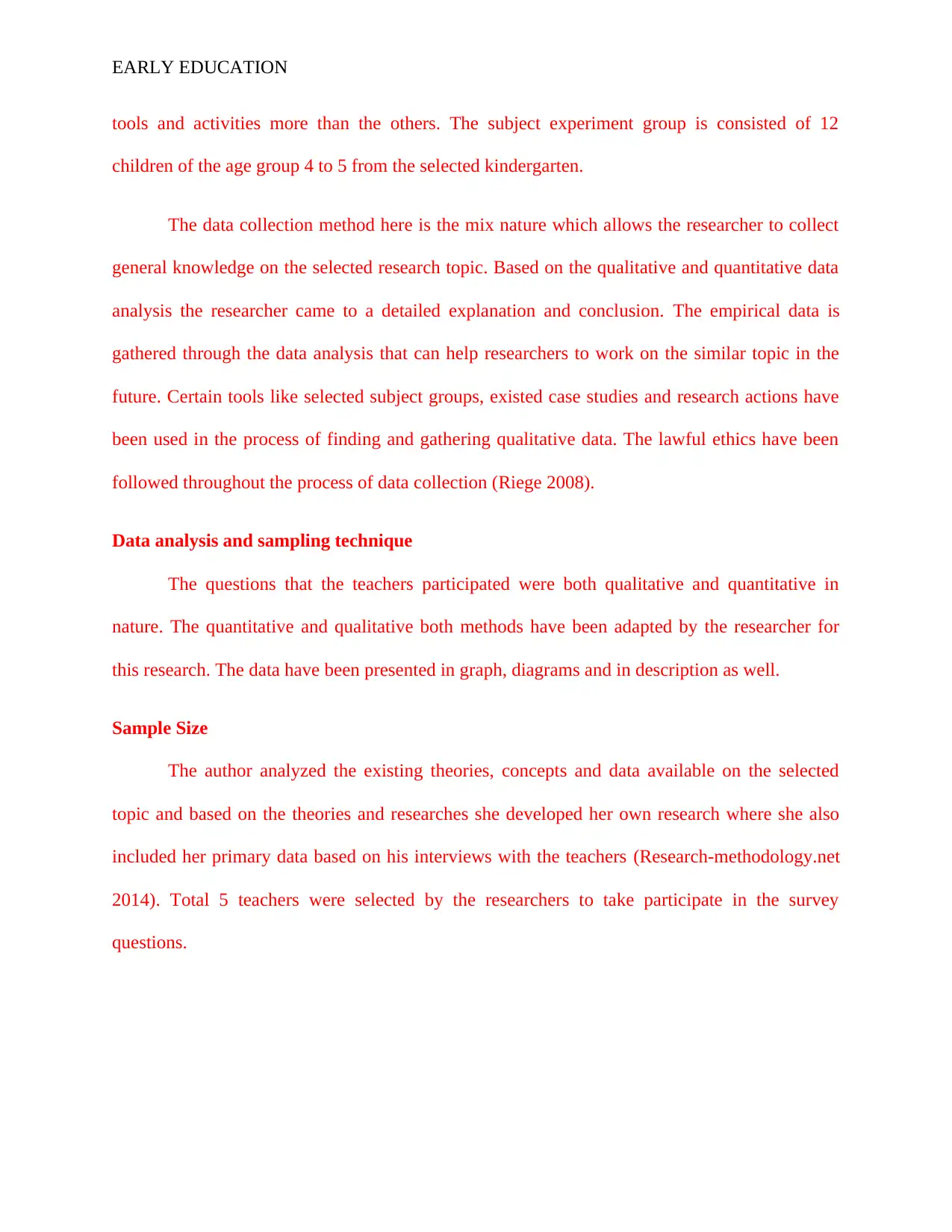
EARLY EDUCATION
tools and activities more than the others. The subject experiment group is consisted of 12
children of the age group 4 to 5 from the selected kindergarten.
The data collection method here is the mix nature which allows the researcher to collect
general knowledge on the selected research topic. Based on the qualitative and quantitative data
analysis the researcher came to a detailed explanation and conclusion. The empirical data is
gathered through the data analysis that can help researchers to work on the similar topic in the
future. Certain tools like selected subject groups, existed case studies and research actions have
been used in the process of finding and gathering qualitative data. The lawful ethics have been
followed throughout the process of data collection (Riege 2008).
Data analysis and sampling technique
The questions that the teachers participated were both qualitative and quantitative in
nature. The quantitative and qualitative both methods have been adapted by the researcher for
this research. The data have been presented in graph, diagrams and in description as well.
Sample Size
The author analyzed the existing theories, concepts and data available on the selected
topic and based on the theories and researches she developed her own research where she also
included her primary data based on his interviews with the teachers (Research-methodology.net
2014). Total 5 teachers were selected by the researchers to take participate in the survey
questions.
tools and activities more than the others. The subject experiment group is consisted of 12
children of the age group 4 to 5 from the selected kindergarten.
The data collection method here is the mix nature which allows the researcher to collect
general knowledge on the selected research topic. Based on the qualitative and quantitative data
analysis the researcher came to a detailed explanation and conclusion. The empirical data is
gathered through the data analysis that can help researchers to work on the similar topic in the
future. Certain tools like selected subject groups, existed case studies and research actions have
been used in the process of finding and gathering qualitative data. The lawful ethics have been
followed throughout the process of data collection (Riege 2008).
Data analysis and sampling technique
The questions that the teachers participated were both qualitative and quantitative in
nature. The quantitative and qualitative both methods have been adapted by the researcher for
this research. The data have been presented in graph, diagrams and in description as well.
Sample Size
The author analyzed the existing theories, concepts and data available on the selected
topic and based on the theories and researches she developed her own research where she also
included her primary data based on his interviews with the teachers (Research-methodology.net
2014). Total 5 teachers were selected by the researchers to take participate in the survey
questions.
⊘ This is a preview!⊘
Do you want full access?
Subscribe today to unlock all pages.

Trusted by 1+ million students worldwide
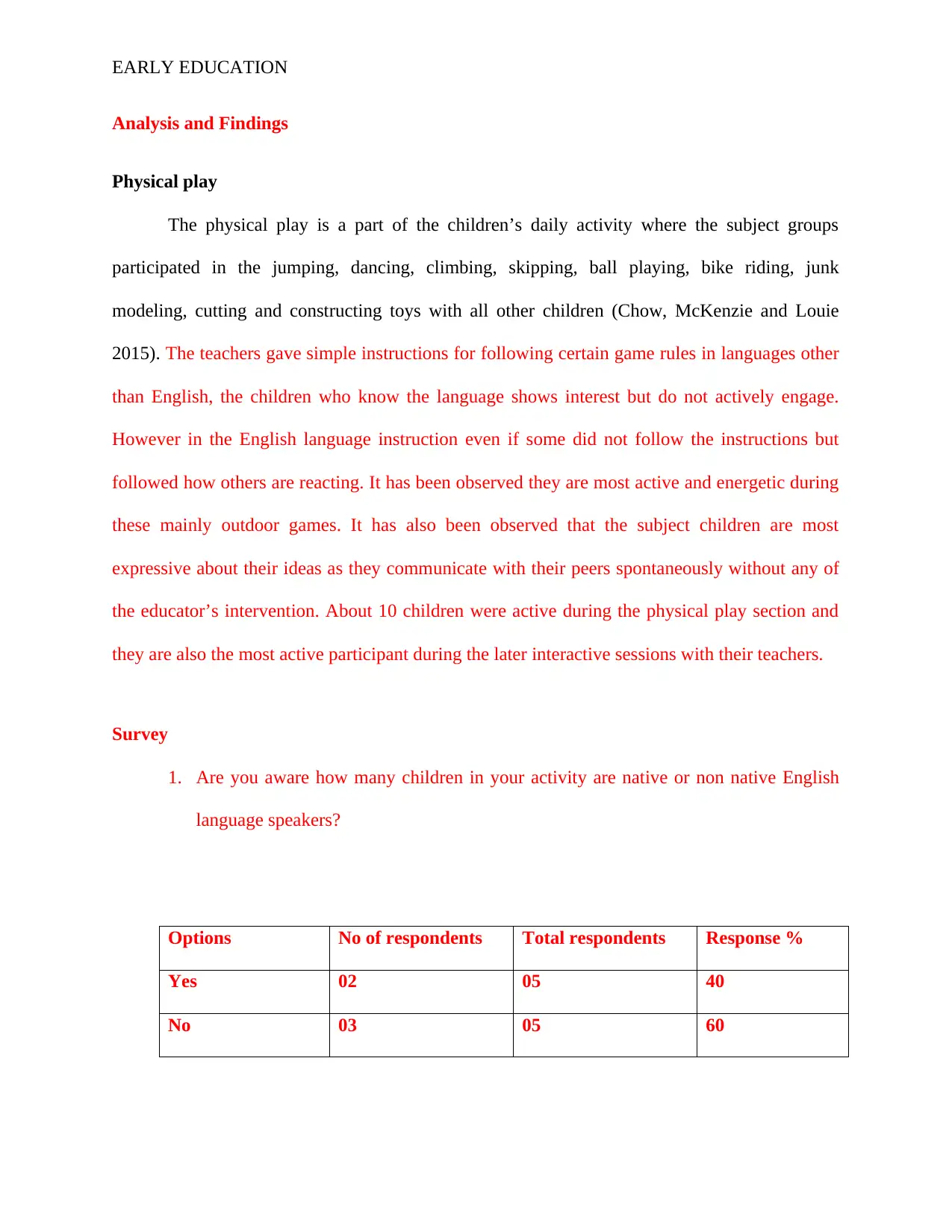
EARLY EDUCATION
Analysis and Findings
Physical play
The physical play is a part of the children’s daily activity where the subject groups
participated in the jumping, dancing, climbing, skipping, ball playing, bike riding, junk
modeling, cutting and constructing toys with all other children (Chow, McKenzie and Louie
2015). The teachers gave simple instructions for following certain game rules in languages other
than English, the children who know the language shows interest but do not actively engage.
However in the English language instruction even if some did not follow the instructions but
followed how others are reacting. It has been observed they are most active and energetic during
these mainly outdoor games. It has also been observed that the subject children are most
expressive about their ideas as they communicate with their peers spontaneously without any of
the educator’s intervention. About 10 children were active during the physical play section and
they are also the most active participant during the later interactive sessions with their teachers.
Survey
1. Are you aware how many children in your activity are native or non native English
language speakers?
Options No of respondents Total respondents Response %
Yes 02 05 40
No 03 05 60
Analysis and Findings
Physical play
The physical play is a part of the children’s daily activity where the subject groups
participated in the jumping, dancing, climbing, skipping, ball playing, bike riding, junk
modeling, cutting and constructing toys with all other children (Chow, McKenzie and Louie
2015). The teachers gave simple instructions for following certain game rules in languages other
than English, the children who know the language shows interest but do not actively engage.
However in the English language instruction even if some did not follow the instructions but
followed how others are reacting. It has been observed they are most active and energetic during
these mainly outdoor games. It has also been observed that the subject children are most
expressive about their ideas as they communicate with their peers spontaneously without any of
the educator’s intervention. About 10 children were active during the physical play section and
they are also the most active participant during the later interactive sessions with their teachers.
Survey
1. Are you aware how many children in your activity are native or non native English
language speakers?
Options No of respondents Total respondents Response %
Yes 02 05 40
No 03 05 60
Paraphrase This Document
Need a fresh take? Get an instant paraphrase of this document with our AI Paraphraser
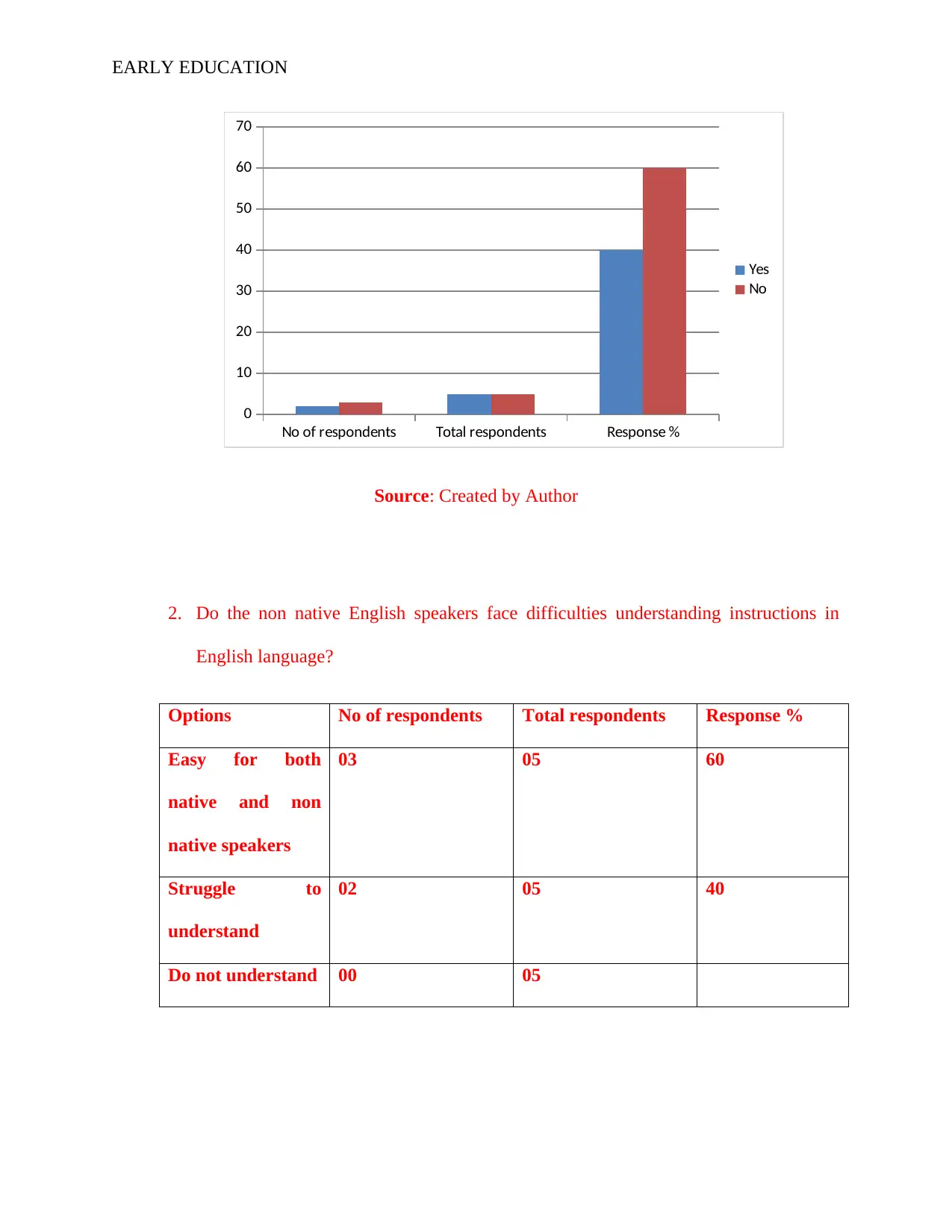
EARLY EDUCATION
No of respondents Total respondents Response %
0
10
20
30
40
50
60
70
Yes
No
Source: Created by Author
2. Do the non native English speakers face difficulties understanding instructions in
English language?
Options No of respondents Total respondents Response %
Easy for both
native and non
native speakers
03 05 60
Struggle to
understand
02 05 40
Do not understand 00 05
No of respondents Total respondents Response %
0
10
20
30
40
50
60
70
Yes
No
Source: Created by Author
2. Do the non native English speakers face difficulties understanding instructions in
English language?
Options No of respondents Total respondents Response %
Easy for both
native and non
native speakers
03 05 60
Struggle to
understand
02 05 40
Do not understand 00 05
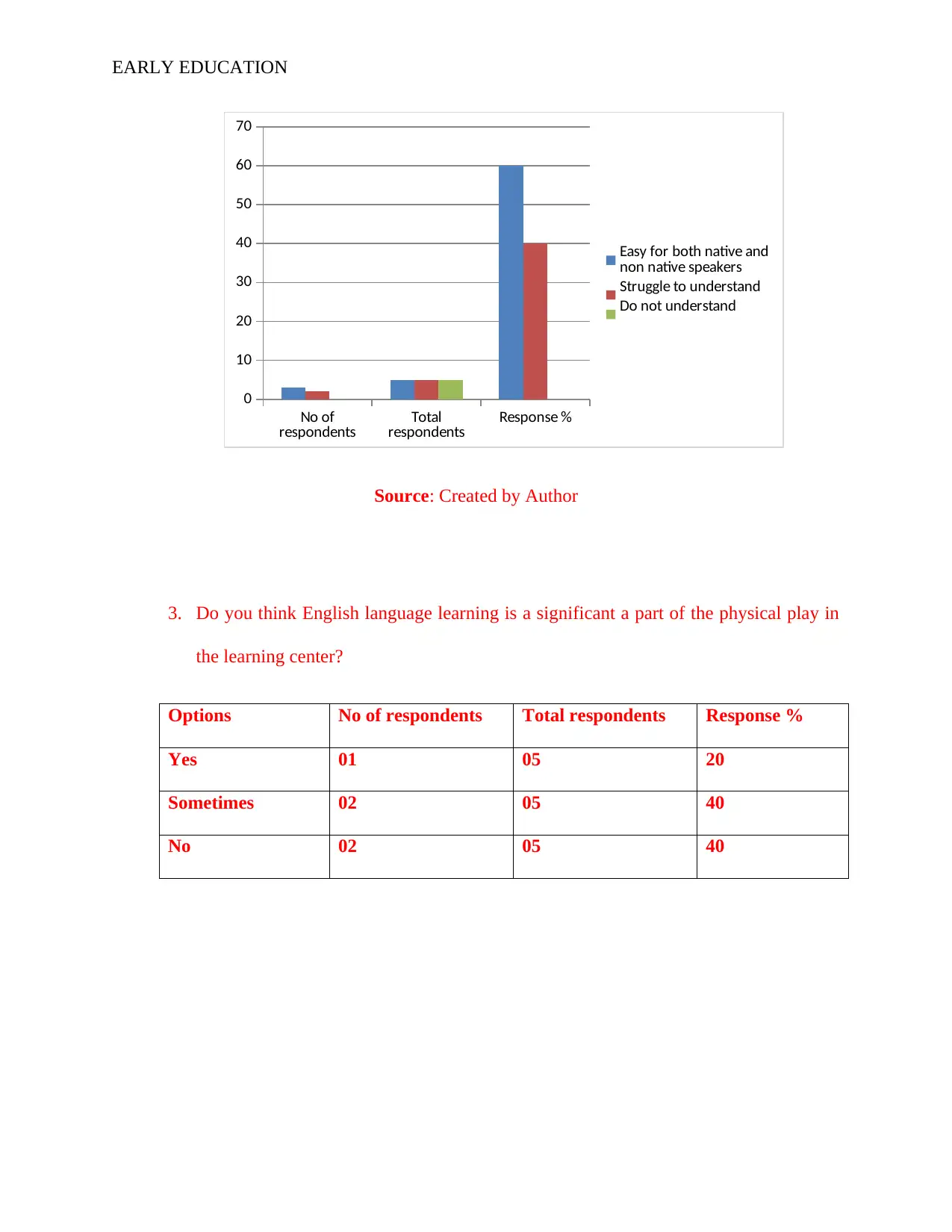
EARLY EDUCATION
No of
respondents Total
respondents Response %
0
10
20
30
40
50
60
70
Easy for both native and
non native speakers
Struggle to understand
Do not understand
Source: Created by Author
3. Do you think English language learning is a significant a part of the physical play in
the learning center?
Options No of respondents Total respondents Response %
Yes 01 05 20
Sometimes 02 05 40
No 02 05 40
No of
respondents Total
respondents Response %
0
10
20
30
40
50
60
70
Easy for both native and
non native speakers
Struggle to understand
Do not understand
Source: Created by Author
3. Do you think English language learning is a significant a part of the physical play in
the learning center?
Options No of respondents Total respondents Response %
Yes 01 05 20
Sometimes 02 05 40
No 02 05 40
⊘ This is a preview!⊘
Do you want full access?
Subscribe today to unlock all pages.

Trusted by 1+ million students worldwide
1 out of 27
Related Documents
Your All-in-One AI-Powered Toolkit for Academic Success.
+13062052269
info@desklib.com
Available 24*7 on WhatsApp / Email
![[object Object]](/_next/static/media/star-bottom.7253800d.svg)
Unlock your academic potential
Copyright © 2020–2026 A2Z Services. All Rights Reserved. Developed and managed by ZUCOL.





